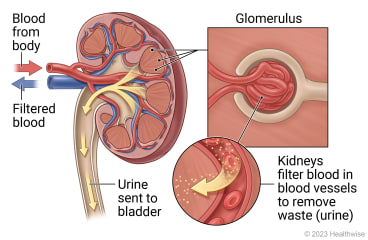
Overview
Glomerulonephritis (say "gluh-mair-yuh-loh-nih-FRY-tus") is inflammation of the many tiny filters in your child's kidneys (glomeruli). A glomerulus is a cluster of blood vessels that filters fluid and waste from the body as urine.
Depending on the cause of the inflammation, your child may not have any symptoms. Or your child may have foamy urine, high blood pressure, or swelling in the face, feet, or hands.
Glomerulonephritis can be caused by an infection or some medicines. It can also be caused by diseases like diabetes or lupus. Sometimes the cause is not known.
This illness may get better with treatment. But it often leads to long-term (chronic) kidney disease.
Treatment may include:
- Corticosteroid medicines. These reduce inflammation.
- Immunosuppressive medicines. These reduce inflammation.
- One or more medicines to lower blood pressure.
- Dialysis, in some cases. This is a treatment that does the work for your child's kidneys to filter waste from the blood.
Follow-up care is a key part of your child's treatment and safety. Be sure to make and go to all appointments, and call your doctor if your child is having problems. It's also a good idea to know your child's test results and keep a list of the medicines your child takes.
How can you care for your child at home?
- Have your child take medicines exactly as prescribed. Call your doctor if you think your child is having a problem with a medicine. You will get more details on the specific medicines your doctor prescribes.
- A dietitian can help you make an eating plan with the right amounts of salt (sodium), potassium, and protein. Your child may also need to limit how much fluid they drink each day.
- Do not give your child anti-inflammatory medicines such as aspirin and ibuprofen (Advil, Motrin). These can make kidney problems worse. It is okay to use acetaminophen (Tylenol).
- Seek support for you and your child. You can get help from family, friends, and a counselor if needed. Long-term illnesses can be difficult and stressful for you and your child.
When should you call for help?
Call 911 anytime you think your child may need emergency care. For example, call if:
- Your child passes out (loses consciousness).
Call your doctor now or seek immediate medical care if:
- Your child has new or worse nausea and vomiting.
- Your child has much less urine than normal or has no urine.
- Your child is feeling confused or cannot think clearly.
- Your child has new or more blood in the urine.
- Your child has new swelling.
- Your child is dizzy or lightheaded, or feels about to faint.
Watch closely for changes in your child's health, and be sure to contact your doctor if:
- Your child does not get better as expected.
Current as of: October 11, 2024
Author: Ignite Healthwise, LLC Staff
Clinical Review Board
All Healthwise education is reviewed by a team that includes physicians, nurses, advanced practitioners, registered dieticians, and other healthcare professionals.

